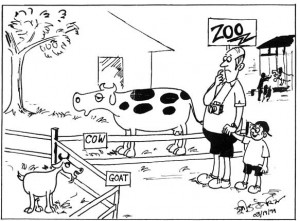 The other day I was at the Union County College (UCC) to participate in a seminar/talk about immigrant issues as portrayed in works of art and literature. The topic emerged from the works of Jhumpa Lahiri, since her two books, “Interpreter of Maladies” and “The Namesake”, are being selected as the college novels for the 2008-2009 term. After my talk, few of us were chatting regarding how we deal with cultural differences in our everyday life in this country. Each of us were narrating some incidents in our life and in connection to “The Namesake” we were talking about the significance of names in different cultures, how we address each other, and how they are being interpreted. When I was giving the example of how, in the film “The Namesake”, Ashoke and Ashima reacted when Maxine addressed Ashoke by his first name, one of the faculty members mentioned that she doesn’t like her students address her by her first name. This came as a surprise to me, cause in many cases I have seen students addressing their professors by their first name, and at the insistence of the professors themselves. The UCC professor also mentioned that in one instance, when one of her students addressed her as “Miss”, she didn’t like it either. I told her that in India, we used to call our lady teachers in schools as “Miss” and maybe that’s what this student thought would be appropriate to address her, although “Madam” would have been more appropriate especially in a college. She then felt much better. One of the UCC students, mentioned that in her home country (Portugal), they would not even address their teachers as “you”. For example, instead of asking one’s professor, “Would you like a cup of coffee?”, she would ask “Would Prof. Das like a cup of coffee?” Addressing the Prof as “you” would have been too demeaning.
The other day I was at the Union County College (UCC) to participate in a seminar/talk about immigrant issues as portrayed in works of art and literature. The topic emerged from the works of Jhumpa Lahiri, since her two books, “Interpreter of Maladies” and “The Namesake”, are being selected as the college novels for the 2008-2009 term. After my talk, few of us were chatting regarding how we deal with cultural differences in our everyday life in this country. Each of us were narrating some incidents in our life and in connection to “The Namesake” we were talking about the significance of names in different cultures, how we address each other, and how they are being interpreted. When I was giving the example of how, in the film “The Namesake”, Ashoke and Ashima reacted when Maxine addressed Ashoke by his first name, one of the faculty members mentioned that she doesn’t like her students address her by her first name. This came as a surprise to me, cause in many cases I have seen students addressing their professors by their first name, and at the insistence of the professors themselves. The UCC professor also mentioned that in one instance, when one of her students addressed her as “Miss”, she didn’t like it either. I told her that in India, we used to call our lady teachers in schools as “Miss” and maybe that’s what this student thought would be appropriate to address her, although “Madam” would have been more appropriate especially in a college. She then felt much better. One of the UCC students, mentioned that in her home country (Portugal), they would not even address their teachers as “you”. For example, instead of asking one’s professor, “Would you like a cup of coffee?”, she would ask “Would Prof. Das like a cup of coffee?” Addressing the Prof as “you” would have been too demeaning.
Experiencing culture shock, and then to learn to absorb the shock, is what we have been doing every day since we arrived in this country. It is not only the language and behavior that matters, but also our environment and our surroundings surprises us quite often. Things that we take for granted and feel are obvious in one culture becomes something rare and exotic in another. The case in point is highlighted in the above cartoon. Long time ago, I had taken my kids to the zoo and was amazed too see common animals like goats and cows, whom we used to see everyday in the streets of India, are kept in a zoo for kids to watch and pet. Similarly, when visitors from India come here and see herds of deer in our backyard, they get excited cause in India you get to see a deer only in a zoo or in one of the exotic forest reserves.
I used to be shocked to see common people keeping snakes and lizards as pets in this country. In India, we always tried (in vain) to stay away from these reptiles. The list of such shocking experiences goes on and on.
Why not share your culture shock experience with us all? We can have a good laugh together. So click the comment link and jot down one of your hilarious experiences. We all will feel much better.
